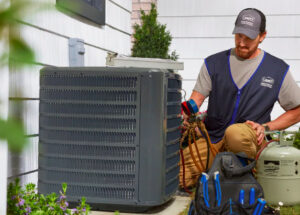Having a good HVAC system helps to keep indoor temperatures comfortable. It also reduces energy costs. An HVAC design specialist can help you determine what is best for your plant, helping you meet air quality and energy efficiency goals. HVAC systems come in two main varieties: ducted and ductless. Ductless systems lack air ducts and use alternative methods to distribute treated air.
HVAC systems are vital to modern home and business owners, helping to keep occupants comfortable and healthy throughout the changing seasons. The system comprises several components that provide optimal indoor air quality. Understanding the basics of HVAC systems from https://alltemprefrigerationfl.com/ can help homeowners and business owners make the best decisions for their needs.
The heating aspect of an HVAC system regulates the temperature of a living or working space. The system works by using a boiler, furnace, or heat pump to generate heat, which is then transferred into a space through conduction or convection. This heat can then be used to regulate the temperature of an entire room or building. This is the most important function of an HVAC system as it helps ensure that spaces are kept at a reasonable and comfortable temperature, allowing occupants to focus and work in comfort.
Ventilation is another important function of an HVAC system, as it allows fresh air to be pumped into the space. This fresh air can help to increase the oxygen levels in the space, which can improve a person’s health and well-being. The ventilation aspect of an HVAC system also includes the use of air filters to clean the air and remove harmful particles and allergens.
Another important function of an HVAC system is its ability to help maintain the humidity of a space. By bringing in fresh air, the humidity level can be maintained at an ideal amount to ensure a comfortable environment. The HVAC system can also be used to control the dew point, ensuring that the space is not too dry or too wet.
While there are many different types of HVAC systems available on the market, most of them contain similar components. The most common type is a split system, which has an air conditioner based outside of the property and a fan/coil inside of the home or business. Ductwork is then used to carry the conditioned air into various rooms within the property.
Other types of HVAC systems include packaged units and ductless systems. Packaged units are less common and consist of a single unit that produces both heating and cooling. Ductless systems, on the other hand, are designed to be more energy efficient and offer more flexibility in terms of how they are installed in a space.
Types
When it comes to HVAC systems, there are many different types to choose from. Each one consists of a variety of components that work together to make your home comfortable all year round. Some of these are air conditioners and furnaces, ductwork, thermostats, and other units that improve ventilation or filter out pollutants. Each unit has its own purpose, but all are designed to help you maintain your ideal indoor temperature and clean, fresh air.
One of the most common types is a split system. These HVAC systems have an air conditioner that’s based outside the property, with a fan/coil inside that blows air throughout your house. The ductwork that distributes this air is what you might be most familiar with, since you’ve likely seen it in homes and other buildings.
Other HVAC systems combine the heating and cooling functions into a single unit, which is located outdoors. These are less efficient than split systems and don’t work well in cold climates, but they can still provide acceptable indoor temperatures for those who live in warmer areas.
A gas furnace is another type of HVAC system that uses a combustion process to heat air before pushing it through a vent into the interior space. It’s a common choice for people living in colder regions. Oil furnaces, which are less common today, work similarly, though they use a different fuel source.
Air conditioning is the main function of HVAC systems, but they’re also useful for heating and ventilating buildings. This ensures that air in the building is breathable and comfortable, regardless of the weather outside. This is why so many commercial spaces and hospitals use HVAC systems, which are often more complex than residential ones.
Other HVAC systems are used for specific purposes, such as a hydronic heating system. This system uses a boiler to heat water that’s then distributed through pipes under the floors in the building. It’s a more energy-efficient choice than traditional furnaces, but it might not be suitable for every home, especially if the floors are made of wood or other delicate materials.
Cost
The cost of a new HVAC system can vary depending on the size of your home and the type of system you choose. A new high-efficiency system can save you money on your energy bills. In addition, a new system will have smart features that can improve the comfort of your home.
Most homeowners will find the cost of an HVAC replacement to be a significant investment. However, the investment will be recouped through lower utility bills. It is also important to have a professional inspect your current system and determine if it is worth the cost of replacing it.
Package units are the most common type of HVAC systems. They consist of an outdoor unit that includes a compressor, condenser coil and fan that removes heat from the air. It also has a set of refrigerant lines that connect the indoor and outdoor unit. Package units are typically smaller than other types of HVAC systems and are ideal for larger homes and businesses such as warehouses. They are also more affordable than other types of HVAC systems.
HVAC systems with a high SEER rating are more efficient than older models. They use about 1/3 less fuel to perform the same job as older systems. Additionally, high-efficiency systems are better for the environment because they consume fewer natural resources.
An inefficient HVAC system can increase your utility bills significantly. Older HVAC systems usually have a SEER rating of about 8 to 10. Newer units can have a SEER rating as high as 21.
Installing a new high-efficiency HVAC system can save you money on your energy bills and keep your family comfortable all year round. It can also add value to your home if you plan on selling it in the future.
You can finance a new HVAC system by using your home equity. Many banks allow you to borrow against your home’s equity, which will reduce your loan-to-value ratio and may help you qualify for a lower interest rate. Additionally, you can purchase a new HVAC system with a tax credit.
Maintenance
If you’re a property manager who has a regular HVAC maintenance program in place, then you should be able to minimize the number of emergency repair calls from your tenants. In addition, quality work results in higher client satisfaction and better tenant retention. The most important aspect of any HVAC maintenance program is identifying potential problems and making repairs before they become major. This will help your system last longer and save you money in the long run.
HVAC system maintenance involves inspecting, cleaning, testing and adjusting the components of the heating and cooling unit. This includes the evaporator coils, condensate drain line, fan blades and blower motor. It also involves lubricating parts to reduce friction and wear. Additionally, a technician will check for electrical problems like loose connections or signs of overheating. The thermostat will be calibrated and tested for accuracy.
Many people only think about their HVAC systems after they begin to break down. This is a dangerous way to treat such an essential piece of equipment. During routine maintenance, professionals can catch issues before they strain the system beyond repair. As a result, it will be more efficient and require less electricity to operate.
In addition to reducing energy bills, HVAC maintenance can also help save the environment. An efficiently functioning system uses less energy, so it produces fewer carbon emissions. In turn, this helps to conserve natural resources and protect the climate.
Most manufacturers want proof that the system has been regularly maintained to guarantee their warranty. Failure to do so can void the warranty and cost you money in the future. Besides, failing to do regular maintenance can lead to poor performance, which could increase the risk of a costly breakdown.
A major HVAC malfunction can happen at any time, especially during hot and cold weather or while you’re on vacation. This can lead to discomfort for your tenants and even health hazards. Moreover, it can be expensive to replace an old and inefficient system. So, plan ahead and choose a preventive maintenance provider that offers various service plans at competitive prices.
